We know that the best drinks for sports performance and any type of muscle recovery include electrolytes, but do you know about integrative hydration? The new wave of hydration techniques includes more than just sodium, calcium and potassium.
Read on to learn about the benefits of integrative hydration and our Matcha-Aid Adaptogenic Electrolyte Blend.
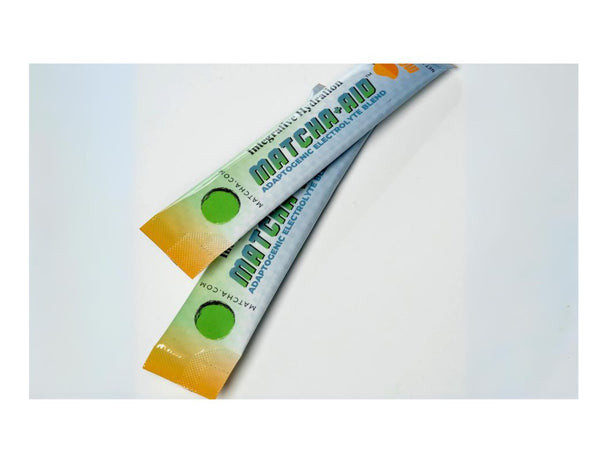
What is integrative hydration?
Integrative hydration is the practice of combining multiple ingredients with varying health benefits into one drink in order to improve hydration, recovery and overall health. It’s a great hydration technique for athletes and anyone else looking to boost their health.
What are electrolytes?
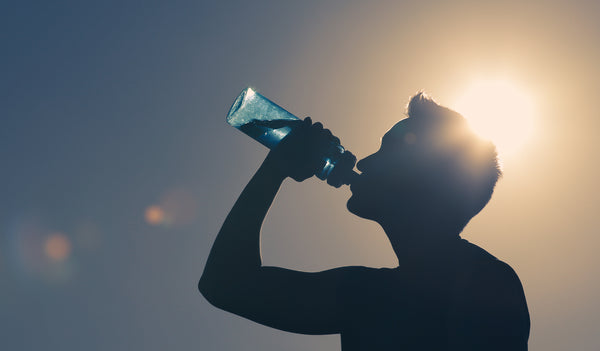
Electrolytes are substances that help your body regulate the amount of water inside and outside of your cells which makes them key for staying properly hydrated. Electrolytes, when dissolved in water, can naturally hold a positive or negative charge. That ionic charge is what permits the conductivity of electricity and electricity is how our bodies move chemical compounds in and out of cells.
Some of the most common electrolytes include sodium, magnesium and potassium.
Sodium helps cells maintain the right balance of fluids. If you don’t have enough sodium, your reflexes weaken and you can be confused, nauseous and irritable.
Magnesium helps cells turn nutrients into energy. If you don’t have enough magnesium you can experience muscle weakness and loss of muscle control.
Potassium is critical to heart function. If you don’t have enough potassium you’ll feel muscle weakness and cramps, feel very thirsty and experience dizziness.
Matcha for energy and recovery
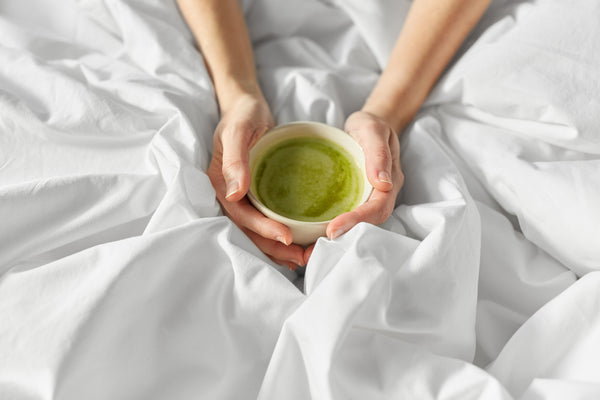
The antioxidants, amino acids and fiber in matcha make it ideal for helping your muscles adapt to the fatigue that comes from muscle training.
Matcha is packed full of antioxidants that are proven to reduce inflammation and muscle soreness making your recovery from muscle straining activities significantly easier.
The EGCG in matcha increases your metabolism and can help you continue to burn fat even after your workout is over.
Matcha is also known to relax and rehydrate you. The l-theanine in matcha keeps you calm, cool and stress free. It can help reduce your heart rate and settle you down while the caffeine in matcha helps keep your energy up after a workout.
Ginseng for performance and fatigue
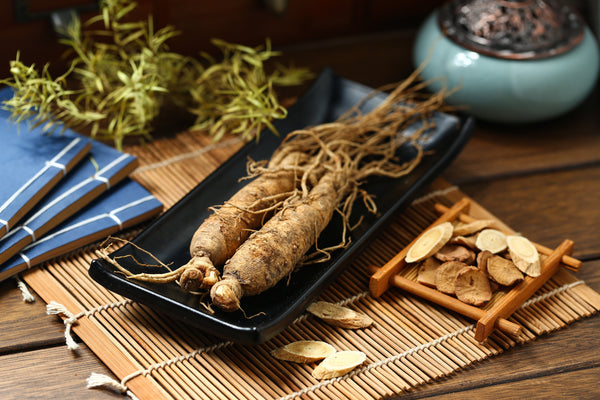
Ginseng is a plant and its roots have been used for medicinal purposes in Asia and North America for centuries. The major components of ginseng are called ginsenosides and have many pharmacological benefits including treating cancer, diabetes, inflammation, stress. Ginseng also has essential oils, antioxidants, peptides, amino acids and vitamins.
The active ingredients in ginseng have been scientifically proven to reduce fatigue and improve the intensity and power output of those who ingest it.
Cordyceps for hydration and recovery
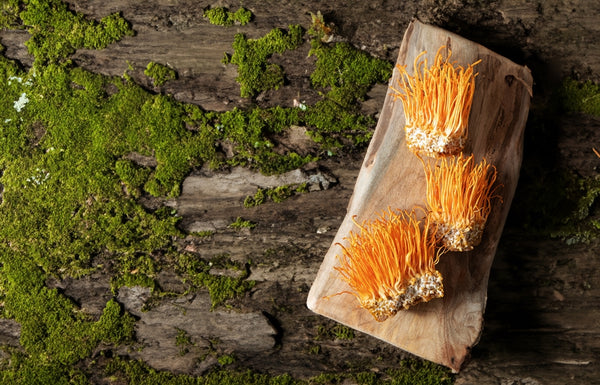
Cordyceps are a fungus with over 600 variants of species. Cordyceps have been used for more than 1,500 years in Chinese medicine! Cordyceps are known for boosting strength and energy, improving immunity and enhancing kidney function.
Cordyceps improve performance by increasing blood flow, enhancing the way our bodies utilize oxygen and supplying antioxidants to reduce the oxidative stress that our bodies experience after vigorous exercise.
Matcha - Aid
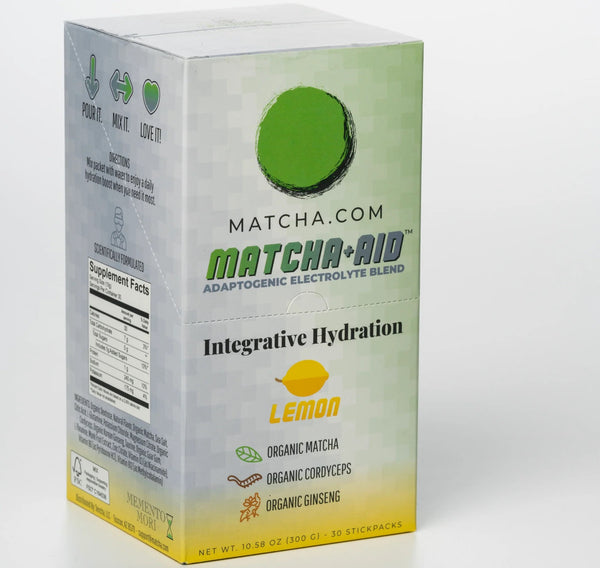
Our Matcha- Aid combines matcha, sodium, magnesium, potassium, ginseng and cordyceps to make an integrative hydrating drink that will both improve performance, speed up recovery and contribute to overall health for people of all ages.
Because Matcha-Aid uses integrative hydration to bring you both energy and fatigue fighting ingredients it's perfect as a pre or post workout drink. Matcha-aid is a much healthier alternative to traditional sports drinks and pre workout formulas.
With lemon and mango flavor options, both of which are thirst quenching and delicious, we suggest mixing matcha-aid with regular water, ice water or lemon water. There’s no need to sift Matcha- Aid, just add to water and shake!
There are so many benefits of drinking matcha-aid, some related to workouts and recovery and others that aren’t! Benefits include:
- Great for pre/post workout
- Hydrating and relaxing for when traveling
- Healthy alternative to an energy drink for tired parents
- Will help cure a hangover and energize you for your day
- Great for breastfeeding moms!
Bottom line -
Make integrative hydration your go-to method of rehydrating and recovering and your body will thank you!
Disclaimer: These statements in this blog post have not been evaluated by the Food and Drug Administration. The information provided here is for educational purposes only and should not be considered medical advice. It's essential to consult with a qualified healthcare professional before making any dietary or lifestyle changes.
Resources:
Shigeta, M., Aoi, W., Morita, C., Soga, K., Inoue, R., Fukushima, Y., Kobayashi, Y., & Kuwahata, M. (2023). Matcha green tea beverage moderates fatigue and supports resistance training-induced adaptation. Nutrition journal, 22(1), 32. https://doi.org/10.1186/s12937-023-00859-4
Hirsch, K. R., Smith-Ryan, A. E., Roelofs, E. J., Trexler, E. T., & Mock, M. G. (2017). Cordyceps militaris Improves Tolerance to High-Intensity Exercise After Acute and Chronic Supplementation. Journal of dietary supplements, 14(1), 42–53. https://doi.org/10.1080/19390211.2016.1203386
Bach, H. V., Kim, J., Myung, S. K., & Cho, Y. A. (2016). Efficacy of Ginseng Supplements on Fatigue and Physical Performance: a Meta-analysis. Journal of Korean medical science, 31(12), 1879–1886. https://doi.org/10.3346/jkms.2016.31.12.1879
Wee JJ, Mee Park K, Chung AS. Biological Activities of Ginseng and Its Application to Human Health. In: Benzie IFF, Wachtel-Galor S, editors. Herbal Medicine: Biomolecular and Clinical Aspects. 2nd edition. Boca Raton (FL): CRC Press/Taylor & Francis; 2011. Chapter 8. Available from: https://www.ncbi.nlm.nih.gov/books/NBK92776
Shrimanker, I., & Bhattarai, S. (2023). Electrolytes. In StatPearls. StatPearls Publishing. https://pubmed.ncbi.nlm.nih.gov/31082167/
Shirreffs, S. M., & Sawka, M. N. (2011). Fluid and electrolyte needs for training, competition, and recovery. Journal of sports sciences, 29 Suppl 1, S39–S46. https://doi.org/10.1080/02640414.2011.614269
National Research Council (US) Subcommittee on the Tenth Edition of the Recommended Dietary Allowances. Recommended Dietary Allowances: 10th Edition. Washington (DC): National Academies Press (US); 1989. 11, Water and Electrolytes. Available from: https://www.ncbi.nlm.nih.gov/books/NBK234935/







